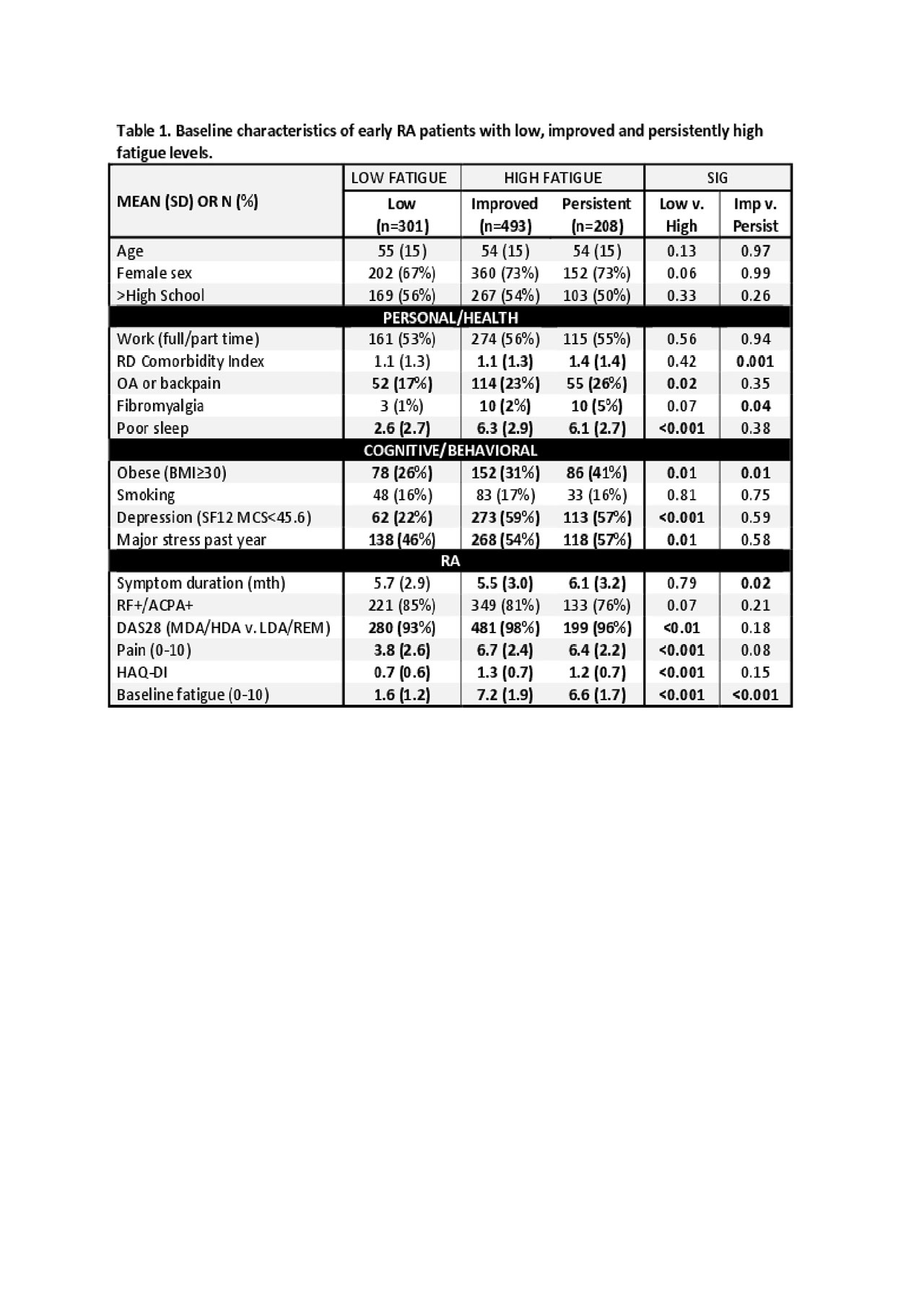Session Information
Date: Sunday, November 10, 2019
Title: RA – Diagnosis, Manifestations, & Outcomes Poster I: Risk Factors, Predictors, & Prognosis
Session Type: Poster Session (Sunday)
Session Time: 9:00AM-11:00AM
Background/Purpose: Although overwhelming fatigue is common at the onset of RA, some patients continue to experience debilitating high levels of fatigue that impact mood, interfere with work and home life, social participation, and result in poor QoL. Among people with high fatigue at diagnosis, we examined characteristics and identified predictors associated with improved vs. persistent fatigue in the first year of RA.
Methods: Data were from early RA patients (symptoms < 1 year) enrolled in the Canadian Early Arthritis Cohort (CATCH) from 01-2007 to 03-2017. All met ACR1987 or 2010 ACR/EULAR criteria, had active disease, were on DMARDS, and complete fatigue (0-10 NRS) data over ≥ 12 months. Patients were classified at baseline with low (< 4) or high (≥ 4) fatigue; patients who reported high fatigue at baseline were categorized at 12 months as having improved (↓ ≥ 2) or persistently (↓ < 2) high fatigue and multivariable logistic regression was used to identify baseline predictors of improvement.
Results: Participants (N=1002) were mostly white (81%) and female (71%) with a mean (SD) age of 54 (15); 32% were obese. At diagnosis, 70% reported high levels of fatigue; as compared to those with low fatigue, high fatigue patients were significantly (p >.05) more likely to have high disease activity and OA/back pain, be obese, and report greater pain, disability, sleep disturbance, depression, and major stressors in the previous year (Table 1). There was a trend for high fatigue patients to be female and seropositive.
At 12 months, 70% of patients with high fatigue reported significant improvements in fatigue. Patients with improved fatigue were significantly less likely to be obese or have fibromyalgia, and had fewer comorbidities, a shorter symptom duration, and lower initial fatigue (Table 2). In adjusted multivariable models, baseline predictors of improved fatigue at 1 year was BMI < 30 (OR 0.6; 95% CI 0.4, 0.9) after controlling for other Table 1 characteristics.
Conclusion: Debilitating fatigue is common around the time of RA diagnosis and is associated with more active disease, worse pain and disability, and OA/back pain, obesity, depression, poor sleep, and major stressors in the previous year. In patients who presented with high fatigue, 70% improved by the end of the first year. Obesity decreased the odds of improved fatigue at 12 months by 40%. In contrast, other RA presenting characteristics were not associated with improvement. Early MTX use and optimizing weight, sleep, and mood may help address persistent fatigue when RA inflammation is well controlled. These results underscore the potential benefits of multidisciplinary interventions in ERA.
To cite this abstract in AMA style:
Bartlett S, Schieir O, Valois M, Hitchon C, Bessette L, Hazlewood G, Thorne C, Pope J, Boire G, Tin D, Keystone E, Bykerk V, (CATCH) Investigators C. When Will I Get past This Exhaustion? Predictors of Improved Fatigue in the First Year of RA [abstract]. Arthritis Rheumatol. 2019; 71 (suppl 10). https://acrabstracts.org/abstract/when-will-i-get-past-this-exhaustion-predictors-of-improved-fatigue-in-the-first-year-of-ra/. Accessed .« Back to 2019 ACR/ARP Annual Meeting
ACR Meeting Abstracts - https://acrabstracts.org/abstract/when-will-i-get-past-this-exhaustion-predictors-of-improved-fatigue-in-the-first-year-of-ra/

